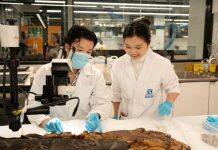Christchurch is already seeing the benefits of a memorandum of understanding between the University of Canterbury (UC) and ChristchurchNZ, through an additional agreement with UC’s Centre for Entrepreneurship (UCE) to deliver various programmes, including ThincLab Canterbury.
The three-year agreement will give Christchurch businesses access to UC’s exceptional student and academic talent, impactful research and development opportunities. UC students will benefit from working with companies through internships and projects as well as being able to see the real-world impact their work and research can have on society.
ThincLab Canterbury, part of Callaghan Innovation’s National Founder Incubator and ThincLab networks, is one part of the agreement to jointly develop an innovative ecosystem in Christchurch to grow our most ambitious local startups, and the commercialisation of research.
Dr Rachel Wright, Director of UCE and ThincLab Canterbury programme director, says Canterbury is in a unique position to authentically brand itself as a city of innovation and entrepreneurship, and attract talent to power a dynamic ecosystem focussed on the city’s supernode strategy.
“COVID-19 has given us an opportunity to grow jobs and reposition Christchurch as an innovative and agile city ready and able to respond to changes in our business environment,” Dr Wright says.
“Together the partnership will lead to more engagement with our business community, new innovations and build Canterbury’s capability, attracting new business and experts to the region and creating jobs.”
“The ThincLab incubator will act like an ‘engine room’ to support high-growth startups that back ChristchurchNZ’s strategy and connect investors, mentors, commercial partners and government agencies,” she says.
The network provides startup companies with space to work and access to mentors and investors in Australia, Singapore and Europe. It also provides joint programmes and webinars with partners and in time, students and members of the ThincLab incubator will be able to take advantage of in-situ opportunities to learn about international markets.
Three student startups developing under ThincLab Canterbury already benefitting from the partnership include Vxt, Zincovery and Kea Aerospace.
Vxt, co-founded by Luke Campbell and Lucy Turner, have created a mobile app that uses artificial intelligence to help manage and automate voice messages. Vxt successfully launched in Australia in February and the USA in July this year.
Zincovery, the brainchild of Jonathan Ring and Associate Professor Aaron Marshall, is focused on recycling spent acid and recovering pure zinc – a true leap forward towards a cleaner global future for industries reliant on galvanising.
Kea Aerospace, co-founded by Dr Philipp Sueltrop, and Mark Rocket (early investor in Rocket Lab) is building the largest unmanned solar powered aircraft (wingspace 32 metres) in the southern hemisphere to capture high resolution aerial images over large areas that will provide much needed information to transform precision agriculture, environmental monitoring and disaster management.







































